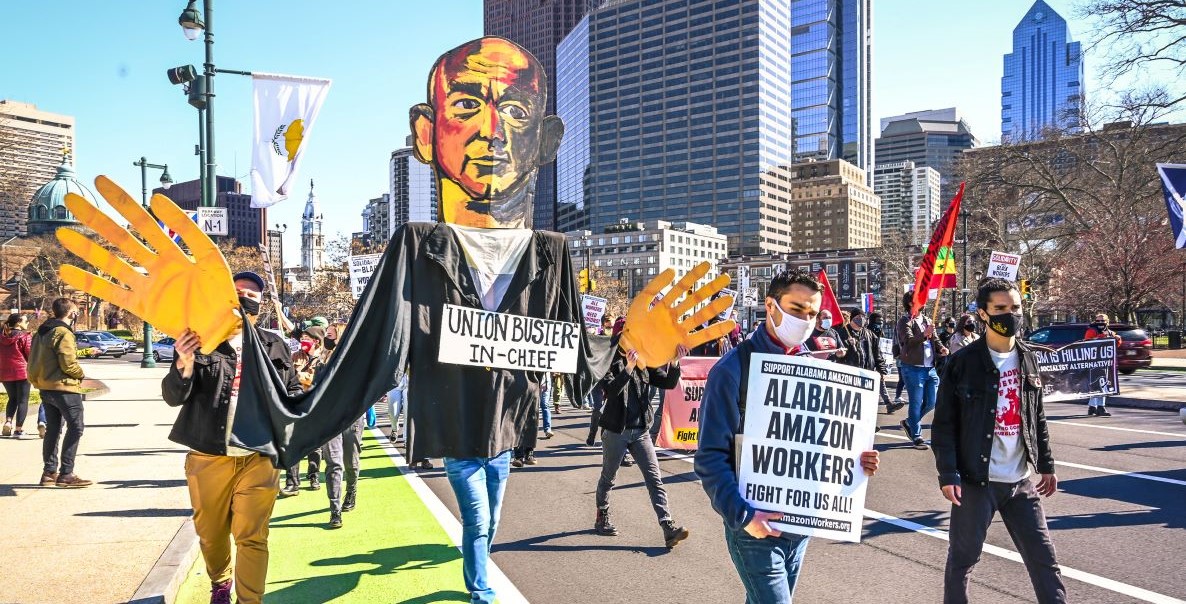Joe the Plumber died in August, and while during the presidential race of 2008 he was in fact trying to buy a business and bemoaning to presidential candidate Obama that his tax policy would penalize his effort and success, his embrace by the McCain campaign came to represent something else. Something far greater. Joe the Plumber’s move to the right signaled a tectonic shift in American politics: The identification of the working class with the Republican Party.
Elites from both parties still fail to recognize the significance of this change as they go on and on about cultural issues. What we truly need to pay attention to as we organize support on the right are attitudes and policy towards organized labor. Maybe it is time for the right to embrace unions.
A layoff proves telling
I was laid off a few weeks ago by REI. Yes, it’s one of the most progressive companies in the country and I had to keep my political leanings to myself, but, after a long career in retail and other working-class jobs, REI was the best place I ever worked. Unusual for retail, there were employees in the store who had been with the company for more than a decade. Everybody was exceptionally knowledgeable about what they sold and the customers, or members of the REI Co-op, were well served, well-equipped for their outdoor adventures, and extremely satisfied with their in-store experience. I made fast friends and planned to hold the job until retirement.
I was a sales lead, and the department I worked in was doing well on all measures of success. But hours began to be cut and new, part-time employees were hired. This is happening everywhere. This pattern lurks behind the low unemployment rates that politicians and economists brag about. When a company cuts ten hours a week from an employee’s schedule the employee can’t file an unemployment claim for those ten hours. And they can’t quit to go find something else better, because if you quit you can’t file for unemployment either. So the unemployment rate remains low even though low-level workers are working less and earning less.
People in the working class can’t buy a house anymore; they can barely take vacations or even get new tires for the car when they’re needed. The management class has gotten richer and richer as the people I have worked with have fallen farther and farther behind.
This is what has happened at REI. Long-time employees lamented that something in the company culture began to change. The place just felt different, and it showed up in employee surveys. Instead of promoting from within, the company hired new executives from big-box retailers like Bed Bath and Beyond and Target. Then came the layoffs. The sales lead position was eliminated; some were reassigned, and others were let go.
The company was pretty upfront about what they were doing. They said in communications that they were eliminating 275 positions so they could hire 1,200 new people. Obviously they were replacing higher salary full-time workers with part-time seasonal staff. They were shortsighted about the value of deeply invested knowledge and the fact that customers came to the stores to share this knowledge. They’d never get that from part-time seasonal staff. The company’s relationship with its workforce had changed.
But culture is hard to change. Employees still deeply care about each other. At the store I worked at, coworkers circulated a petition to demand the company hire back those of us who were dismissed. Other stores began to organize and opened up communications with union reps. REI’s stance was predictable. This company that for so long had promoted the most progressive causes and championed workers’ rights hired the best lawyers in the nation to keep the union out.
A fundamental change
My feelings about unions became very complicated. I remember when I was a kid and my dad crossed a picket line, a person walking the line threw himself against my father’s car and sued him. My mom was a business owner and very opinionated about how workers sought to take advantage of owners and do as little as possible for maximum gain. I tossed the whole idea of organized labor into the trash heap of socialist and Marxist causes and left it there with what I thought were other bad ideas of the left.
But I’ve worked a long time, and I’ve seen things change. People in the working class can’t buy a house anymore; they can barely take vacations or even get new tires for the car when they’re needed. The management class has gotten richer and richer as the people I have worked with have fallen farther and farther behind.
This was not the case a few decades ago. Something fundamental has changed: Workers have become increasingly disenfranchised. Each political party seems obsessed with the actions of the other being a threat to democracy. The real threat to democracy is that the average person, unless they already own a house or have inter-generational wealth, can’t buy a house anymore. Property ownership is crucial to being a citizen fully supportive of the community goals and shared responsibility that are necessary for democracy to thrive. But ownership is coming to fewer and fewer people and — especially — to LLCs and corporations. Workers are overlooked and taken advantage of for less and lesser gain.
Unions for the right, too
Workers organizing for rights and opportunity is not the exclusive domain of the left. Throughout modern history, the most significant political changes have come from workers organizing, and this has occurred in both left-wing and right-wing revolts. To reconsider their relationship with labor and grasp the zeitgeist of workers’ dissatisfaction and coordinate with those workers to create an honest nation of shared responsibility and legitimate opportunity, thinkers on the right are going to have to reconsider some of their old Marxist union tropes.
Companies and entrepreneurs that have instituted profit-sharing and fully included workers in the decisions, sacrifices, and rewards that lead to business success have thrived.
For example, the class struggle about ownership of the factors of production. The idea that workers’ organizing to have some control over how they are treated and rewarded for their work by seizing ownership of companies will penalize entrepreneurs. This issue is already settled and not to be feared.
Today, workers’ 401ks hold over 6 trillion dollars of stock in public companies. Twenty-two percent of the value of the S&P 500 is owned by these funds. Pensions, a hallmark of union benefits, drive these numbers even higher. Owning such a large piece of American business and being representative of the largest cost of those businesses — labor — certainly gives workers the right to demand a seat on the boards of the companies they struggle for.
And they do struggle. I’ve been a working-class laborer for most of my career, and I’ve found almost all of my coworkers to be hard-working and truly concerned about their organizations’ success. Even when management has treated them terribly. Another anti-union trope that union workers don’t work as hard, kill productivity, result in mediocrity, and reduce profits seems antiquated and mere propaganda of those who would fight to the death to prevent workers from taking any share of their profits. But the companies and entrepreneurs that have instituted profit-sharing and fully included workers in the decisions, sacrifices, and rewards that lead to business success have thrived.
Meanwhile, on the right, the elites keep rolling out the free market, globalization-lift-all-boats arguments as mainstream Republican thinking. But for the real mainstream, this has led to lower wages, less ownership, and less opportunity. The right needs to stop vilifying organized labor and the working class it can represent if it is truly going to win the right to represent the mass of workers who have already rejected many progressive ideals to find themselves without a political home that honestly cares about them and their slipping grip on the American Dream.
George Hofmann writes the newsletter Practicing Mental Illness. He lives in Philadelphia with his wife, their daughter, too much coffee, and a dog.
![]() MORE FROM OUR PARTNERSHIP WITH BROAD + LIBERTY
MORE FROM OUR PARTNERSHIP WITH BROAD + LIBERTY




